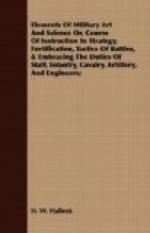“Caesar,” says a distinguished senator of our own country, “was rightfully killed for conspiring against his country; but it was not he that destroyed the liberties of Rome. That work was done by the profligate politicians without him, and before his time; and his death did not restore the republic. There were no more elections: rotten politicians had destroyed them; and the nephew of Caesar, as heir to his uncle, succeeded to the empire on the principle of hereditary succession.”
“And here History appears in her grand and instructive character, as Philosophy teaching by example: and let us not be senseless to her warning voice. Superficial readers believe it was the military men who destroyed the Roman republic! No such thing! It was the politicians who did it!—factious, corrupt, intriguing politicians—destroying public virtue in their mad pursuit after office—destroying their rivals by crime—deceiving and debauching the people for votes—and bringing elections into contempt by the frauds and violence with which they were conducted. From the time of the Gracchi there were no elections that could bear the name. Confederate and rotten politicians bought and sold the consulship. Intrigue and the dagger disposed of rivals. Fraud, violence, bribes, terror, and the plunder of the public treasury commanded votes. The people had no choice; and long before the time of Caesar, nothing remained of republican government but the name and the abuse. Read Plutarch. In the ‘Life of Caesar,’ and not three pages before the crossing of the Rubicon, he paints the ruined state of the elections,—shows that all elective government was gone,—that the hereditary form had become a necessary relief from the contests of the corrupt,—and that in choosing between Pompey and Caesar, many preferred Pompey, not because they thought him republican, but because they thought he would make the milder king. Even arms were but a small part of Caesar’s reliance, when he crossed the Rubicon. Gold, still more than the sword, was his dependence; and he sent forward the accumulated treasures of plundered Gaul, to be poured into the laps of rotten politicians. There was no longer a popular government; and in taking all power himself, he only took advantage of the state of things which profligate politicians had produced. In this he was culpable, and paid the forfeit with his life. But in contemplating his fate, let us never forget that the politicians had undermined and destroyed the republic, before he came to seize and to master it.”
We could point to numerous instances, where the benefits of war have more than compensated for the evils which attended it; benefits not only to the generations who engaged in it, but also to their descendants for long ages. Had Rome adopted the non-resistance principle when Hannibal was at her gates, we should now be in the night of African ignorance and barbarism, instead of enjoying the benefits of Roman learning and Roman civilization. Had France adopted this principle when the allied armies invaded her territories in 1792, her fate had followed that of Poland. Had our ancestors adopted this principle in 1776, what now had been, think you, the character and condition of our country?




